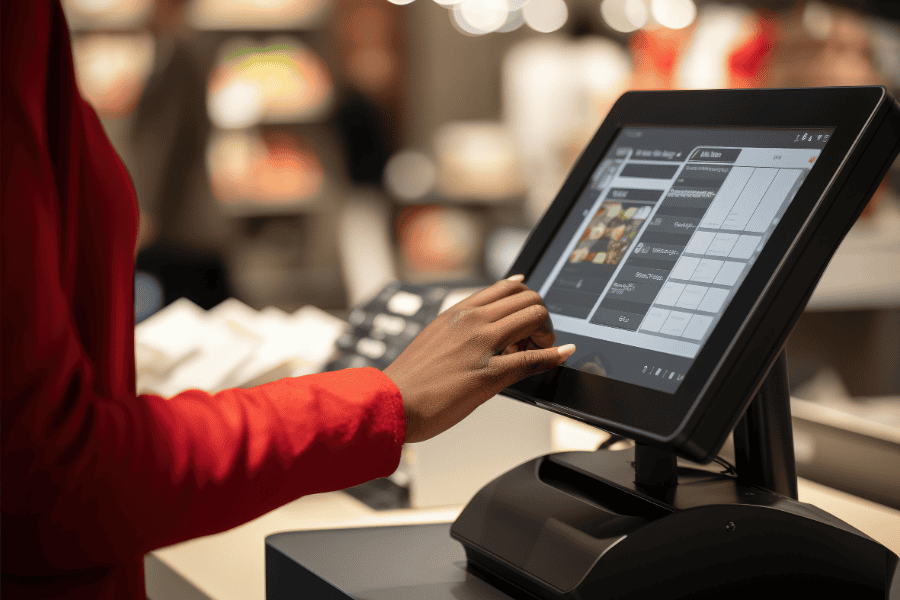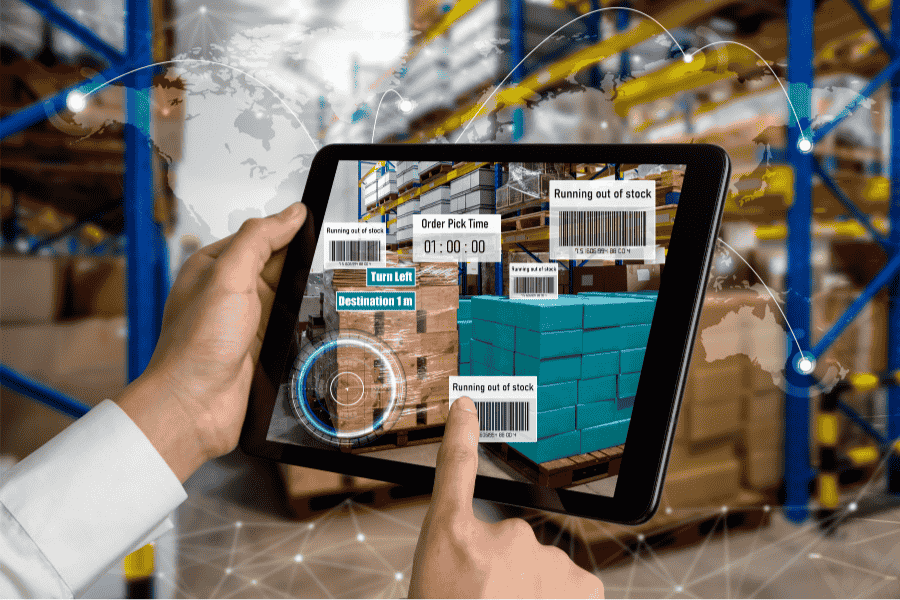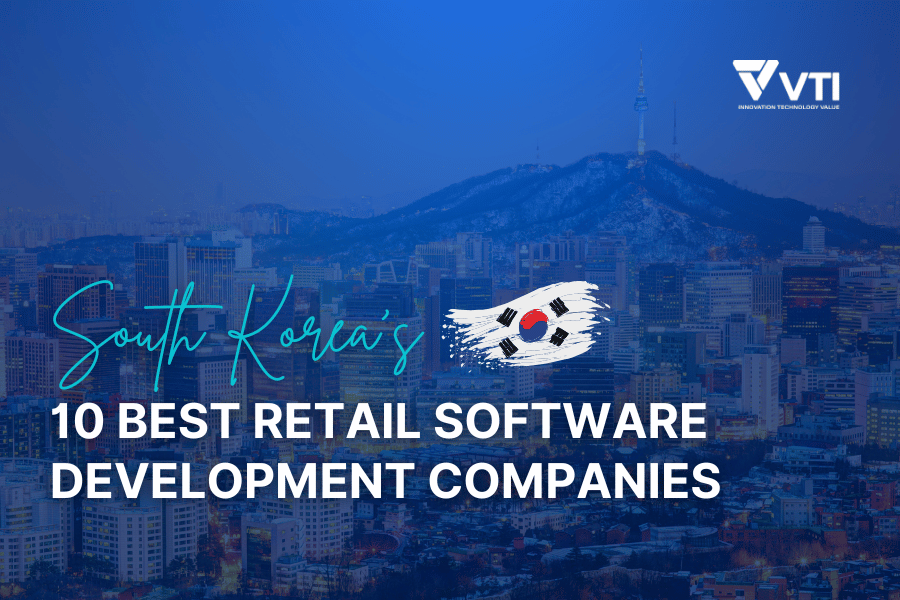
South Korea is rapidly becoming one of Asia’s most dynamic retail technology hubs. With a retail sector projected to reach USD 551.5 billion by 2030, the demand for cutting-edge software development has never been higher. This leads retailers to turn to expert retail software development companies to lead their transformation.
From mobile-first POS platforms to AI-powered loyalty platforms and IoT-enabled inventory tracking, Korean retail businesses are embracing digital transformation at scale. Behind this revolution are retail software development companies that specialize in building custom, scalable, and omnichannel-ready solutions.
In this article, we spotlight the top 10 retail software development companies in Korea, ranked by their innovation, industry expertise, technology capabilities, and project success. If you’re looking for the right tech partner to elevate your retail operations, this list is your starting point, so stay tuned.
Quick Facts: Korea’s Retail Software Market
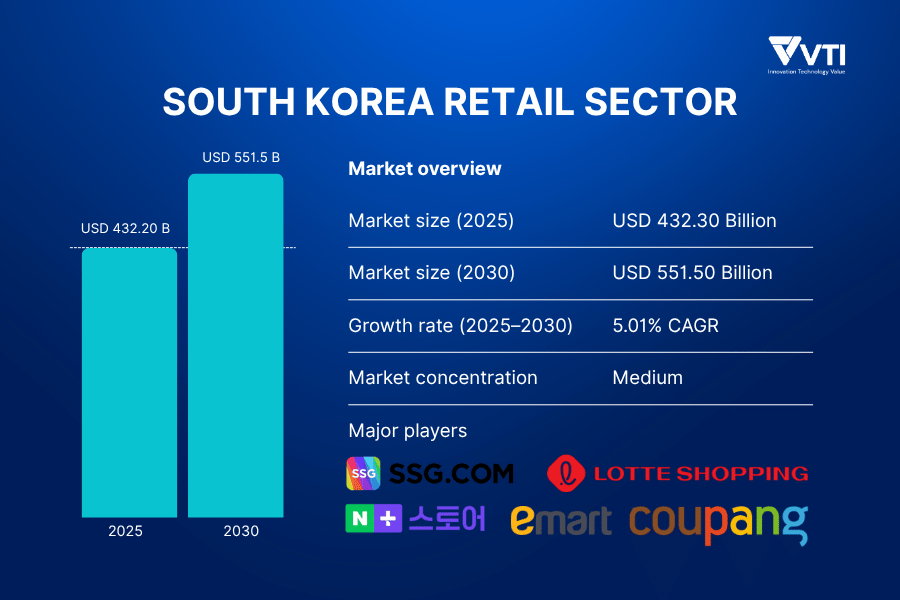
South Korea’s retail industry is not only massive but also one of the most technologically advanced in the world. With mobile shopping, self-checkout apps, and AI-enhanced personalization now the norm, retail businesses here are increasingly relying on specialized retail software development companies to stay competitive.
Here are some key insights that highlight why Korea is a hotspot for retail tech innovation:
| Metric | Details |
| Retail market size (2025) | USD 432.3 billion |
| Retail market size (2030) | USD 551.5 billion |
| E-commerce revenue share | 41.43% of total retail sales |
| Seoul’s retail share | 47.12% of national retail turnover |
| Leading retail formats | Omnichannel grocery, convenience stores, department stores |
| Digital payment adoption | Credit cards: 52.34% share; BNPL growing at 15.20% CAGR |
| Top growth drivers | Mobile-first shopping, digital loyalty, AI-powered UX, cold-chain logistics |
With over 650 convenience stores per brand and near-universal mobile payment coverage, Korea’s retail environment demands advanced, high-performance software solutions.
Key Technology Trends Shaping Retail Software in Korea
As digital-first consumer behavior takes hold, Korea’s retail ecosystem is undergoing rapid transformation. To keep pace, businesses are increasingly investing in custom solutions built by experienced retail software development companies. These innovations are reshaping everything from how shoppers pay to how inventory is managed in real time.
Here’s a closer look at the top technology trends driving Korea’s retail software boom:
mPOS systems and self-checkout
Retailers across Korea are ditching traditional cash registers in favor of mobile-based POS systems that offer speed and convenience. This evolution is driven by consumer demand for convenience and speed, especially in high-traffic supermarkets and convenience stores.
In 2024, the mobile POS systems market in Korea was valued at USD 7.5 billion, with projections showing it could nearly double to USD 15.3 billion by 2033, growing at an 8.9% CAGR (Market Research Intellect). Globally, the mobile POS market is on a similar trajectory, forecasted to reach USD 113.5 billion by 2030. This growth reinforces why Korean retail tech companies are focusing on smart checkout experiences.
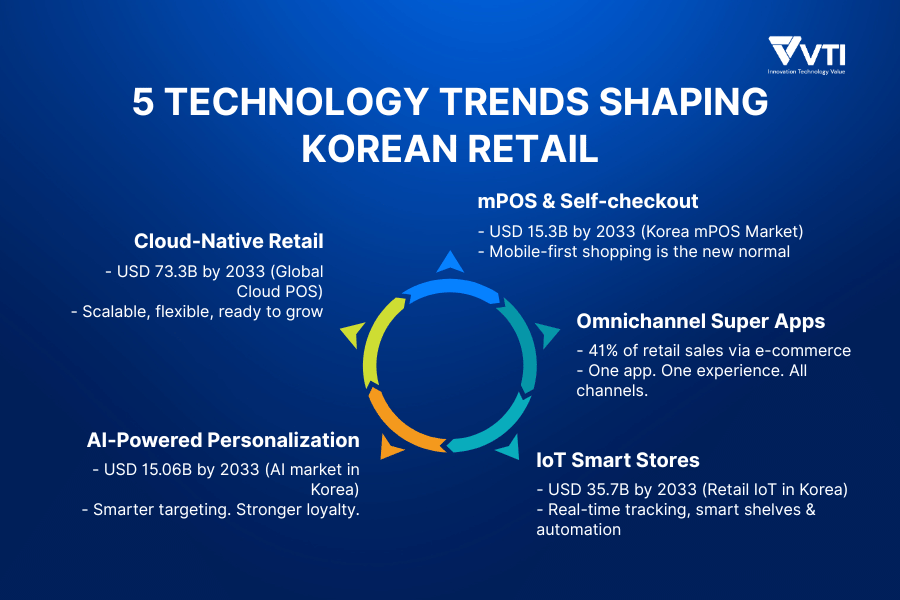
Super apps for omnichannel shopping experiences
With over 41.43% of retail revenue in South Korea generated through e-commerce, omnichannel has become a strategic imperative. Retailers are now deploying super apps that combine in-store shopping, online orders, loyalty programs, personalized promotions, and mobile payments in a single seamless interface.
These all-in-one platforms, typically developed by experienced retail and e-commerce software development companies, allow businesses to unify customer data and deliver a consistent experience across physical and digital channels. As mobile commerce continues to dominate, super apps are emerging as the backbone of Korea’s next-gen retail strategies.
IoT-enabled inventory management and smart stores
Smart stores powered by the Internet of Things (IoT) are on the rise, enabling real-time visibility into inventory and customer behavior. IoT devices like RFID tags, smart shelves, and connected sensors help retailers streamline restocking, reduce shrinkage, and improve supply chain performance.
The retail IoT market in Korea stood at USD 12.34 billion in 2024, with forecasts suggesting it will reach USD 35.7 billion by 2033, growing at a 14.5% CAGR. These tools are increasingly embedded in retail systems developed by Korean retail IT companies, offering analytics dashboards, predictive restocking alerts, and even dynamic pricing models. This trend is particularly strong among grocery chains and department stores focused on operational agility and precision.
AI-powered personalization & intelligent promotions
Artificial Intelligence is transforming how retailers understand and engage customers. From personalized product recommendations and dynamic promotions to automated loyalty programs, AI enables highly individualized shopping experiences that increase conversion and retention.
South Korea’s AI and data analytics market was valued at USD 1.42 billion in 2024 and is expected to grow at a staggering 30% CAGR, reaching USD 15.06 billion by 2033. In response, top retail software development companies are integrating machine learning into their platforms to support real-time targeting, customer segmentation, and behavioral insights. As a result, retailers can deliver meaningful content and offers that build loyalty and boost sales.
Cloud-native architecture for scalability
Legacy systems can’t keep up with the speed of modern retail. That’s why cloud-native architecture is becoming the standard across Korea’s tech-forward retail ecosystem. Cloud-based software allows for faster updates, seamless scalability, and smoother integration with logistics, CRM, and third-party platforms.
Korea’s POS software market is already growing at a 6.2% CAGR, and globally, cloud-based retail POS platforms are projected to reach USD 73.3 billion by 2033, up from USD 27 billion in 2023. Most leading retail software development companies in Korea now offer cloud-first solutions designed for both startups and enterprise chains, enabling faster deployment, remote access, and real-time analytics.
Solutions and Services Offered by Top Korean Retail Software Companies
What sets Korea’s leading retail software development companies apart isn’t just their technical chops. It’s how they translate real-world retail problems into functional, scalable digital solutions. From modernizing checkout to making omnichannel work seamlessly, these teams are powering the future of retail, one feature at a time.
Mobile POS & checkout solutions
One of the most noticeable shifts in Korea’s retail scene is the rise of mobile-first POS systems. These aren’t just cashier terminals on tablets. They’re smart, cloud-connected tools that sync with loyalty programs, inventory, and even promotional engines. Many top companies now offer mPOS apps that allow staff (or customers) to scan items, process payments, and access real-time stock without ever touching a traditional register.
Omnichannel commerce platforms
Today’s shoppers don’t see channels. They see brands. Leading development teams are building seamless omnichannel platforms where a cart started on mobile can be completed in-store, and loyalty points work across all touchpoints. These platforms usually come with custom-built admin panels, real-time product visibility, and integrations with payment gateways and logistics APIs.
Loyalty programs & CRM systems
Customer loyalty in 2025 is about relevance, not just points. That’s why top firms are creating loyalty engines that go beyond stamp cards. Think personalized birthday deals, in-app coupons, and promotions that reflect shopping behavior. These are backed by CRM tools that help retailers engage smarter, not just more often.
Self-checkout and Scan&Go experiences
Scan, pay, and go. It sounds simple, but building these systems effectively requires in-depth retail insight. From security gate validations to managing alcohol restrictions and receipts, leading developers are rolling out Scan&Go apps that fit seamlessly into the store experience. Convenience stores, supermarkets, and even unmanned outlets are all jumping on board.
IoT integration & smart store systems
Retail is getting smarter, and Korean developers are leading the charge. IoT-powered shelves that track stock in real-time, sensors that monitor foot traffic, and RFID tools for loss prevention are just the start. These systems provide the kind of store-level data that helps managers make better decisions every day.
E-commerce websites & native apps
While many retailers use third-party platforms, top Korean retail software companies offer custom-built web and mobile storefronts with better flexibility and branding. These e-commerce engines come optimized for SEO, speed, mobile UX, and backend performance, tailored for everything from flash sales to high-frequency replenishment models.
Retail analytics & personalization engines
Data is everything in modern retail. Leading firms now bake analytics dashboards and personalization models directly into retail systems. Whether it’s recommending products based on past behavior or forecasting next month’s inventory demand, these tools give retailers insight they can act on immediately.
Inventory & supply chain automation
Especially for brands running multiple stores or warehouses, having full visibility into stock is non-negotiable. Top retail tech companies are delivering warehouse management systems, automated restocking alerts, and order orchestration tools that simplify even the most complex supply chains.
In-store digital engagement tools
Kiosks, digital signage, post-checkout surveys, and AR filters are just some of the ways brands are making brick-and-mortar more interactive. These tools turn visits into experiences, and they’re often built as modular add-ons to larger retail platforms.
Read also: Top 7 Trends In Retail Digital Transformation And Innovation
Top 10 Retail Software Development Companies in Korea.
1. VTI Korea
| Headquarters | Seoul, South Korea |
| Employees | 1500+ (global) |
| Focus areas | Retail Software, Smart Retail Solutions, AI/ML, Mobile Development, Cloud, |
| Website | https://vtikorea.co.kr/ |
VTI Korea is a subsidiary of VTI Group, a leading software company across Southeast Asia. With top-tier certifications, including ISO 27001:2022 and CMMI level 3, as well as awards, the group boasts strong technical credibility.
In Korea, VTI’s retail expertise spans unmanned stores, convenience networks, and supermarkets. Trusted by major Asian operators such as USMH, GS25, and Minimart, they deliver full-cycle retail software solutions, from mobile POS and AI-based loyalty tools to cloud systems and smart-store tech, all with agile execution.
2. Samsung SDS
| Headquarters | Seoul, South Korea |
| Employees | ~35,000 (global) |
| Focus Areas | Enterprise IT, smart retail platforms, logistics automation, big data analytics |
| Website | sds.samsung.com |
As the IT arm of Samsung Group, Samsung SDS brings deep enterprise experience to retail software development. They specialize in intelligent logistics, automated inventory systems, and data-driven in-store analytics. Their digital retail platform supports everything from smart shelves to advanced payment systems, making them a key player in enterprise-level digital transformation.
3. Dirox Korea
| Headquarters | Seoul, South Korea |
| Employees | ~200 (Korea) |
| Focus Areas | E-commerce development, UI/UX design, mobile apps, loyalty tools |
| Website | dirox.com |
Dirox focuses on building mobile-first solutions and cross-platform e-commerce systems tailored to fast-moving retailers. Their strength lies in intuitive UI/UX, integrated loyalty tools, and real-time synchronization across sales channels. They’re particularly well-suited for lifestyle, food & beverage, and quick-service retail brands aiming for rapid tech adoption.
4. NEWNOP
| Headquarters | Seoul, South Korea |
| Employees | ~150 (Korea) |
| Focus Areas | IoT systems, in-store automation, smart shelves, kiosk solutions |
| Website | newnop.com |
Specializing in IoT and smart retail technologies, NEWNOP helps businesses deploy intelligent in-store solutions like digital signage, RFID-based inventory tracking, and self-service kiosks. Their ability to bridge hardware with software makes them a reliable partner for retailers exploring smart store formats.
5. Musinsa Tech
| Headquarters | Seoul, South Korea |
| Employees | ~300 (Korea) |
| Focus Areas | Fashion retail platforms, personalization, warehouse automation, analytics |
| Website | musinsa.com/tech |
Musinsa Tech, the technology division of Korea’s fashion giant Musinsa, develops a robust retail infrastructure for fashion e-commerce.
They handle everything from recommendation engines and merchandising tools to warehouse automation and trend forecasting. Their tech supports millions of users across the web and mobile, making them a leader in retail platform engineering.
6. CJ Olive Young Labs
| Headquarters | Seoul, South Korea |
| Employees | ~100 (Korea) |
| Focus Areas | Health & beauty retail tech, loyalty apps, mobile engagement, CRM tools |
| Website | ch-oliveyoung.com/labs |
As the innovation hub of Korea’s top health and beauty retailer, CJ Olive Young Labs focuses on digital experiences that blend in-store and online journeys. Their teams build mobile loyalty apps, personalized marketing systems, and in-store digital engagement tools that enhance customer interaction and drive traffic both online and offline.
7. Softsquared
| Headquarters | Seoul, South Korea |
| Employees | ~250 (Korea) |
| Focus Areas | Retail ERP, POS systems, order management, backend integration |
| Website | softsquared.com |
Softsquared offers custom software development with a focus on retail ERP, order management, and POS systems. Their clients range from boutique retailers to franchise operators looking for end-to-end integration between inventory, payments, and customer databases. They excel at fast deployment and modular architecture.
8. OpenXcell Korea
| Headquarters | Seoul, South Korea |
| Employees | ~500 (global) |
| Focus Areas | E-commerce platforms, cloud POS, API integrations, mobile development |
| Website | openxcell.com |
A global development company with a local presence, OpenXcell builds scalable e-commerce and retail platforms tailored to Korean consumer behavior. They offer full-stack development, cloud-based POS, and API integrations for payment gateways and third-party logistics, making them a versatile partner for growth-stage retailers.
9. VUNO
| Headquarters | Seoul, South Korea |
| Employees | ~200 (Korea) |
| Focus Areas | AI analytics, demand forecasting, recommendation engines, shopper insights |
| Website | vunotv.com |
VUNO, originally known for AI in healthcare, is now applying its deep learning models to the retail sector. Their retail AI solutions include demand forecasting, customer segmentation, and product recommendation engines, helping chains personalize the shopping experience and optimize shelf space using predictive insights.
10. DQSO
| Headquarters | Seoul, South Korea |
| Employees | ~120 (Korea) |
| Focus Areas | WMS, inventory management, logistics integration, backend dashboards |
| Website | dqso.co.kr |
DQSO provides backend-heavy solutions for inventory and warehouse management, tailored to high-volume retail operations. They focus on automation, logistics efficiency, and stock accuracy, critical for businesses managing multiple store locations or omnichannel fulfillment centers.
How to Choose the Right Retail Software Partner in Korea
Choosing a retail software development company isn’t just about comparing portfolios. It’s about finding the right long-term partner who understands your business goals, not just your tech stack. In a market as competitive and fast-moving as Korea, that decision matters more than ever.
Here’s what to look for when narrowing down your shortlist:
Strong industry know-how
Top-performing companies do more than just write code. They understand the business of retail. Whether it’s a high-volume convenience store or an omnichannel fashion brand, the best teams have hands-on experience with real-world challenges like inventory sync, checkout flow, loyalty logic, and store traffic patterns.
This kind of retail-first thinking leads to smarter solutions that feel intuitive, perform reliably, and make a real difference on the floor.
Proven experience with similar projects
Case studies speak louder than sales decks. If you’re planning retail software, find a team that’s built and deployed one at scale. If you’re launching an omnichannel platform, ask for examples where web, mobile, and in-store data all sync seamlessly. Experience in solving your kind of problem is key.
Scalability & future-proofing
You may be starting small, but retail moves fast. Your software partner should build with growth in mind, modular architecture, cloud-native systems, and the flexibility to integrate new features later. Avoid overly rigid or short-term fixes that’ll need a costly rebuild down the road.
Transparent communication & local support
Even with the best tech, projects can get derailed by miscommunication. Make sure the team offers strong local project management and clear, consistent updates. If they operate on a hybrid (onshore-offshore) model, understand who your key contacts will be and how decisions get made.
Security and compliance capabilities
Handling customer data? Processing payments? Managing user accounts? Then you need a vendor that treats security as non-negotiable. Look for credentials like ISO/IEC 27001 and experience with secure payment APIs, GDPR, and local Korean regulations if applicable.
Cultural fit and collaboration style
Last but not least, consider the human side. You’ll be working with this team for months (or years), so choose a partner whose style matches yours. Are they flexible? Proactive? Comfortable with iterations? A good cultural fit can make even tough projects feel manageable.
Check out VTI’s case study: Retail Supper Application: From Long Queues to Seamless Supermarket Shopping, Revolutionizing Retail Digitalization
Summing up
That wraps up our look at the top retail software development companies in Korea. From enterprise platforms to mobile-first innovations, these tech firms are actively reshaping how retail businesses operate in one of Asia’s most advanced markets.
Whether you’re running a supermarket chain, a convenience store network, or launching a digital-first retail brand, VTI Korea brings the experience and engineering talent to help you scale with confidence. If you’re exploring partners in the Korean market or need guidance selecting the right development team, don’t hesitate to reach out. VTI is here to support your next retail milestone.
![[FREE EBOOK] Strategic Vietnam IT Outsourcing: Optimizing Cost and Workforce Efficiency](https://vti.com.vn/wp-content/uploads/2023/08/cover-mockup_ebook-it-outsourcing-20230331111004-ynxdn-1.png)


